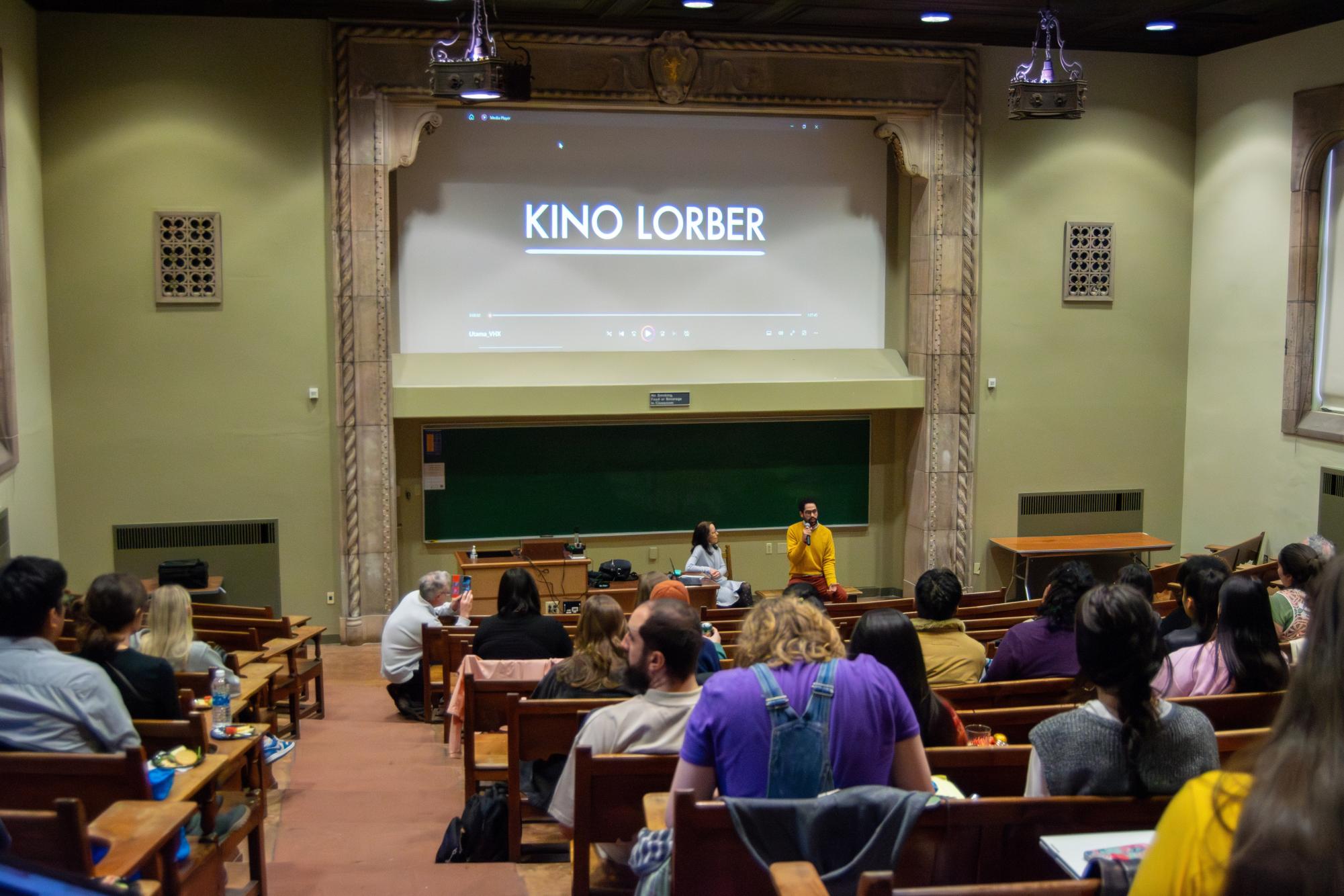Bolivian director Alejandro Loayza Grisi attends Pitt screening of his film ‘Utama’


Alejandro Loayza Grisi answers questions at the film screening of “Utama” in the Cathedral of Learning on Tuesday evening.
The Pitt Spanish and film and media studies departments came together on Tuesday, March 26 to host a screening of the 2022 drama “Utama,” along with the writer and director, Alejandro Loayza Grisi. Loayza made his feature-length directorial debut with the film. “Utama” garnered critical acclaim and won awards including best world cinema drama at Sundance.
Loayza is Bolivian and chose to tell a story celebrating the culture of his home while also discussing themes of climate change, intercultural communication and aging. Critics praised the film, but perhaps the most noteworthy praise was the cinematography. Loayza spoke about his background in photography and how this skill helps him as a filmmaker.
“I started my artistic career as a still photographer. I had a class when I was studying advertisement, where I learned photography in the darkroom in 35mm,” Loayza said. “After I finished studying, I started working with my father. He’s also a filmmaker. He has a production company, and I started working there as a still photographer. And then I started to learn cinematography, and then direction and screenwriting.”
The film tells the story of an old Quechua couple, Virginio and Sisa, who live atop an arid Bolivian plateau. In the film, the Quechua people, who are an indigenous group in Bolivia and other parts of South America, are experiencing an unusually long drought atop the plateau. The couple’s grandson, Clever, visits to spend time with them and possibly convince them to move to the city with him. Clever discovers Virginio is very sick, and drama unfolds between the trio as discussions of family, culture and the changing world complicate their difficult position.
Quechua people and culture are central to the story. Loayza spoke about the importance of preserving the culture and allowing the rest of the world to learn about Quechua people.
“It really is a matter of perspective and how the students are going to be touched,” Loayza said. “And I also believe it’s a window to another country, and it makes me really proud and happy to show a little bit about my country and this very forgotten culture that is the Quechua and it’s also a culture that is disappearing. So it’s very interesting.”
The screening of the “Utama” took place on the third floor of the Cathedral of Learning, and the Spanish department provided food for the viewers. Elizabeth Monasterios, a professor of Latin American literature and Andean studies in the department of Hispanic languages and literature, expressed her happiness with the event turnout.
Monasterios, who is also Bolivian herself, knew Loayza’s father since he was a child. She said film is important to the people of Bolivia.
“When a new [Bolivian] movie comes to the public, then the country goes and watches the movie, because for us, for Bolivians, you go to the movies, not for divertimento [fun], not just to eat popcorn, but to look at yourself, to learn about yourself and learn about history,” Monasterios said. “And that’s why movies are so important and so relevant to Bolivians. Every time that a good film would come, it would be [on] for three months every day, screening three times a day, and it [would] be full of people.”
Monasterios revealed that Pitt was able to host Tuesday’s event due to her connections to other Bolivian professors around the United States. It is common for films to do a screening tour around universities after its festival tour, and the Bolivian connections Monasterios has from other schools allowed Pitt to be included.
Loayza answered questions after the screening, and several attendees revealed how important they felt “Utama” was to their culture. Many people said they saw their own grandparents in the characters and that they could relate to many of the situations they saw in the film.
Bianca Louis-Jacques, a first-year film production major, described how she interacted with the film.
“Watching the characters interact and the plot unfold, I started to really think about my grandma, and how it’s just so relatable to me. I saw Sisa as my grandma,” Louis-Jacques said. “I thought it was so meaningful and so humanistic and relatable to a lot of things going on.”
Recent Posts
First Place | The summer apartment
See two girls: one 19, the other 20. They’re both engineering students far from home,…
Second Place | Moist and buttery gluten-free coffee cake
This gluten-free coffee cake is so indulgent you would never even know it was free…
Third Place | Dinner rush
Runner, please. Hands. Behind. 86 zucchini. Heard. There’s a slight ringing in my ears, and…
Runner-Up | Let me tell you about hobbies and death
Well, everyone has to have a hobby. Mom says you gotta love something or else…
Runner-Up | Artemis
In her dream, the moon exploded. Something hit it from behind — some dark shadow,…
Runner-Up | Setting the scene
My father and I are running through the forest. Our footsteps pound with silent desperation…

